 New research from UK High Street bank Halifax reveals that over half of children between the ages of seven to sixteen years old have bought something over the Internet.
New research from UK High Street bank Halifax reveals that over half of children between the ages of seven to sixteen years old have bought something over the Internet.
Boys are particularly keen on Web shopping with over 60% saying that they’ve bought items over the Internet.
The bank’s survey found that some 53% of young people are Internet shoppers (up 10% from 43% in 2004) with Scottish lads and lassies coming out as the keenest Web shoppers, with 80% buying items over the internet.
The East Midlands region came bottom of the Internet shopping league with only 36% of young people in the area shopping online.
Boys continue to buy more goods over the Internet than girls, with this year’s figures – 60% boys compared to just 46% of girls – continuing last year’s trend where the figures were 50% and 37% respectively.
 Not surprisingly, age plays a big part in who gets to shop online with less than a third of seven to eleven year olds (29%) clicking and buying compared to almost three quarters of twelve to sixteen year olds (73%).
Not surprisingly, age plays a big part in who gets to shop online with less than a third of seven to eleven year olds (29%) clicking and buying compared to almost three quarters of twelve to sixteen year olds (73%).
More than half of all kids interviewed believed that Internet shopping is, like, waaaaaay better to shopping on the high street with 61% finding it easier to buy online rather than in shops for certain items.
Music, DVDs and electronic equipment are the biggest attractions online with kids spending their hard-earned extortion racket earnings, petty theft cash, pocket money on CDs (45%), computer games/equipment (45%) and DVDs/videos (43%).
 Barging its way into the crowded 5 megapixel “super zoom” market is Sony’s new Cyber-shot DSC-H1 camera.
Barging its way into the crowded 5 megapixel “super zoom” market is Sony’s new Cyber-shot DSC-H1 camera. The DSC-H1 sports a fairly small but bright 115,200 pixels electronic viewfinder (EVF) that mirrors the information displayed on the main screen.
The DSC-H1 sports a fairly small but bright 115,200 pixels electronic viewfinder (EVF) that mirrors the information displayed on the main screen. Shutter speeds range from 30 to 1/1000 second, and the camera comes with optical image stabilisation built in (although Sony likes to call it Super Steady Shot’).
Shutter speeds range from 30 to 1/1000 second, and the camera comes with optical image stabilisation built in (although Sony likes to call it Super Steady Shot’). There’s enough manual controls to ensure that adventurous photographers can stay in control of their exposures, with a wide selection of scene modes covering most eventualities.
There’s enough manual controls to ensure that adventurous photographers can stay in control of their exposures, with a wide selection of scene modes covering most eventualities. The BBC has announced a pilot scheme to premiere some new TV programmes before they are broadcast on over traditional channels.
The BBC has announced a pilot scheme to premiere some new TV programmes before they are broadcast on over traditional channels. Jana Bennett, The BBC’s Director of Television, said: “The broadband premiere of The Mighty Boosh is a significant step forward in offering our audiences even greater value in a changing television world.
Jana Bennett, The BBC’s Director of Television, said: “The broadband premiere of The Mighty Boosh is a significant step forward in offering our audiences even greater value in a changing television world. There’s something of a stampede starting up of companies ready and willing to experiment with video over broadband, with BT announcing that it planned to begin trials of
There’s something of a stampede starting up of companies ready and willing to experiment with video over broadband, with BT announcing that it planned to begin trials of 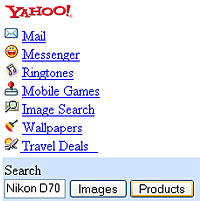 Yahoo! UK and Ireland have launched a handy new mobile search service which allows consumers to check the prices of goods via Yahoo! WAP services when they’re out and about.
Yahoo! UK and Ireland have launched a handy new mobile search service which allows consumers to check the prices of goods via Yahoo! WAP services when they’re out and about.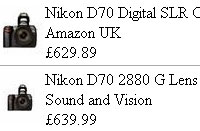 A result screen then displays images, pricing and product information, providing users with the low down about the cheapest prices around.
A result screen then displays images, pricing and product information, providing users with the low down about the cheapest prices around. However, if you persevere and click through to the next results page, a ‘compare’ link should magically appear under some products and this will let you access its full details.
However, if you persevere and click through to the next results page, a ‘compare’ link should magically appear under some products and this will let you access its full details. The European Commission announced yesterday that it wants to give a boot up the backside of the European market for online music services by making it easier for new providers to get licences to flog songs over the Internet.
The European Commission announced yesterday that it wants to give a boot up the backside of the European market for online music services by making it easier for new providers to get licences to flog songs over the Internet. Mobile phone networks in London were overwhelmed for several hours following a series of terrorist blasts across central London.
Mobile phone networks in London were overwhelmed for several hours following a series of terrorist blasts across central London. As with 9/11, many people turned to the Web for news and updates, resulting in major news sites struggling with the enormous surge in traffic.
As with 9/11, many people turned to the Web for news and updates, resulting in major news sites struggling with the enormous surge in traffic.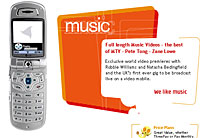 Consumer demand for mobile downloads is going bonkers, according to research by LogicaCMG.
Consumer demand for mobile downloads is going bonkers, according to research by LogicaCMG. Globally, subscribers just lurve downloading ring tones, games and music, with news and sports also gaining a growing audience in Europe.
Globally, subscribers just lurve downloading ring tones, games and music, with news and sports also gaining a growing audience in Europe.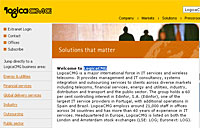 Mobile phone users are starting to experiment with their phones’ capabilities but, drawing a parallel with the popular SMS experience, it is clear that the service needs to be simple, safe and intuitive from initial browsing through to payment and download.
Mobile phone users are starting to experiment with their phones’ capabilities but, drawing a parallel with the popular SMS experience, it is clear that the service needs to be simple, safe and intuitive from initial browsing through to payment and download. US police have arrested a Florida man for gaining illegal access on a domestic wireless Internet network.
US police have arrested a Florida man for gaining illegal access on a domestic wireless Internet network. There’s not much harm in that, but the newspaper report points out the darker side of Wi-Fi pilfering, with criminals using the unsecured networks to traffic in child pornography, steal credit card information and even send death threats.
There’s not much harm in that, but the newspaper report points out the darker side of Wi-Fi pilfering, with criminals using the unsecured networks to traffic in child pornography, steal credit card information and even send death threats.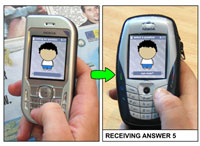 Dysfunctional drunks, lurking loners and nervous nerds need no longer feel alone thanks to a new mobile phone guessing game called YOU-WHO.
Dysfunctional drunks, lurking loners and nervous nerds need no longer feel alone thanks to a new mobile phone guessing game called YOU-WHO.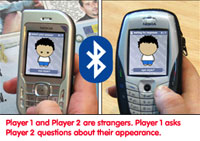 Once a set number of clues have been given, the players’ phones ‘call’ to each other with a distinctive sound, thus revealing both players’ locations and identities, quickly followed by screams of “Aaaargh!” Get away from me you weird freakshow nerd!”
Once a set number of clues have been given, the players’ phones ‘call’ to each other with a distinctive sound, thus revealing both players’ locations and identities, quickly followed by screams of “Aaaargh!” Get away from me you weird freakshow nerd!”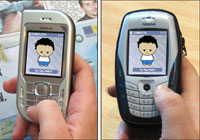 You-WHO is offered as a free 28 day time-limited demo. The cheery young developers at AgeO+ hope to have a full commercial release soon.
You-WHO is offered as a free 28 day time-limited demo. The cheery young developers at AgeO+ hope to have a full commercial release soon.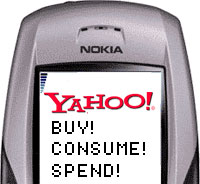 Buying goods with your PC may soon be as hip as dancing to a Chris De Burgh remix if the latest innovation from Yahoo Japan takes off.
Buying goods with your PC may soon be as hip as dancing to a Chris De Burgh remix if the latest innovation from Yahoo Japan takes off.